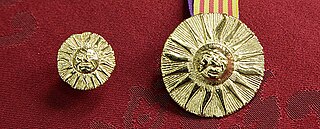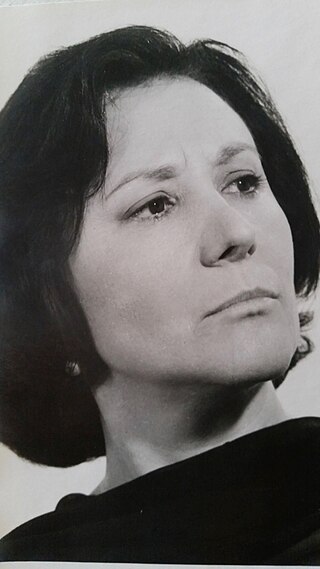
Modernisme, also known as Catalan modernism and Catalan art nouveau, is the historiographic denomination given to an art and literature movement associated with the search of a new entitlement of Catalan culture, one of the most predominant cultures within Spain. Nowadays, it is considered a movement based on the cultural revindication of a Catalan identity. Its main form of expression was Modernista architecture, but it also encompassed many other arts, such as painting and sculpture, and especially the design and the decorative arts, which were particularly important, especially in their role as support to architecture. Modernisme was also a literary movement.

Emma Vilarasau Tomàs is a Spanish stage, film and television actress from Catalonia.

El cor de la ciutat is a TVC television soap opera first broadcast on TV3 on 11 September 2000 and last broadcast on 23 December 2009. The show is the most watched fiction program in Catalonia, Spain, especially among female audiences, drawing around 28-33% of the audience with as much as 40% during season finales. El cor de la ciutat follows the lives of the people who live and work in the neighbourhood of Sants and Sant Andreu in Barcelona, Catalonia, Spain.
Jordi Bosch i Palacios is a Spanish actor.
Polònia is a popular comedy TV show broadcast in Catalonia by the public broadcaster TV3.
PICAP is a Catalan record label headquartered in Castellar del Vallès, Spain. It was founded in 1984.
The Premi d'Honor de les Lletres Catalanes is an award instituted by Omnium Cultural since 1969 to recognize a person by their scientific or literary work, written in Catalan language, the importance of their work and his/her significant contribution to cultural life of the Catalan Countries.

The Concert for Freedom was a concert held at Camp Nou football stadium in Barcelona on 29 June 2013, organized by Òmnium Cultural in conjunction with other civil society organization such as the Assemblea Nacional Catalana and the Plataforma Pro Seleccions Esportives Catalanes with the goal using the universal language of music to demand the right of Catalonia and other nations of the world to freely and democratically decide their future. Some 90,000 people were in attendance. Between the 2012 Catalan independence demonstration and the Catalan Way, the concert was another social mobilization event in favor of independence. More than 400 artists performed, among them Lluís Llach, Sopa de Cabra, Miquel Gil, Pastora, Joana Serrat, Jofre Bardagí, Jordi Batiste, Lídia Pujol, Maria del Mar Bonet, Marina Rossell, Mercedes Peón, Nena Venetsanou, Orfeó Català, Paco Ibáñez, Pascal Comelade, Pau Alabajos, Pep Sala, Peret, Projecte Mut, Sabor de Gràcia, Ferran Piqué, Joan Enric Barceló & Eduard Costa from Els Amics de les Arts, and Brams. The artistic directors were Gerard Quintana and Lluís Danés, who was in charge of set design. The stage featured various steps symbolizing the path toward freedom.

The Sarrià Capuchins are a community of the Capuchins that settled in Barcelona in 1578 after a request of the Consell de Cent, and against the will of the king Philip II.

The Institut Nova Història is a Catalan cultural foundation with headquarters in Barcelona committed to revisionist pseudohistorical research. Its members, of which the most prominent is the Catalan nationalist writer Jordi Bilbeny, hold that history has been systematically manipulated by the Spanish state since the 15th century to eliminate the Catalan contribution to world history. The foundation promotes research, study and dissemination through publications, conferences, documentaries and symposia of its vision of Catalan history. in particular the annual "Symposium on the Catalan Discovery of America" in Arenys de Munt. This has led them to create a "history of their own" whose theses, "more or less picturesques ”, are rejected by both scholars and Academia. Alberto Reig Tapia, from University of Rovira i Virgili considers that their members do not make history but "Parody of History"'. Josep Colomer, from Georgetown University, has called them “cartoon satirists” ». The Institut Nova Història claims that major historical figures, including Christopher Columbus, Erasmus, Miguel de Cervantes, William Shakespeare, Leonardo da Vinci, Saint Teresa of Ávila and others were Catalan. It is funded by the Catalan autonomous government, and has received support from Catalan nationalist politicians.

The Ramon Llull Award is an honor awarded annually by the Government of the Balearic Islands to persons or entities of the Balearic Islands that have excelled in any field. It was established in 1997 by Decree 3/2014.

La Veu de Catalunya was a Catalan newspaper founded by Enric Prat de la Riba that was published in Barcelona from 1 January 1899 to 8 January 1937, with two editions daily.

Teresa Cunillé i Rovira is a Spanish actress with a long and prolific career in stage and film.
The Carles Riba Poetry Prize is a literary prize for Catalan-language works awarded by the Edicions Proa publishing house with funding by the Catalan Encyclopedia Foundation. The winning poem is selected from original, unpublished poems during the Literary Night of Saint Lucía, organized by the Òmnium Cultural association. It has an endowment of €5,000.








